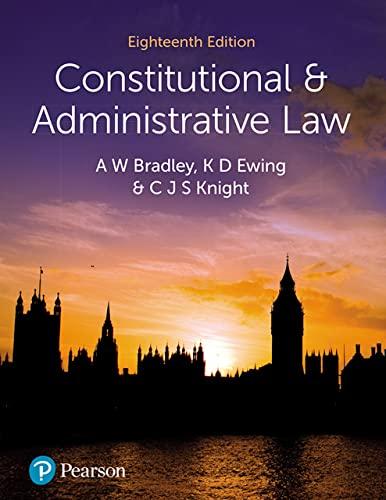Question
Question You are employed as a legal services officer by the NSW Department of Communities and Justice. You have been briefed to provide a submission
Question
You are employed as a legal services officer by the NSW Department of Communities and Justice. You have been briefed to provide a submission to the NSW Attorney General (note you are a public servant and your role is not affiliated with any political party). The Attorney General is reviewing the availability of legal aid for civil and criminal matters in NSW to consider the potential benefits of increasing legal aid funding and/or of revising the current balance of legal aid funding between civil and criminal cases.
Your job is to attend court and review both civil and criminal interlocutory matters which are both legally represented and self-represented to assess how representation by lawyers affects the process. Your job is to use the cases you saw (both represented and unrepresented), together with independent research, as the basis for your submission to the Attorney General.
Your submission to the Attorney General should discuss the advantages and disadvantages of the NSW Government increasing legal aid funding compared with maintaining current funding levels and the suitability of the current allocation of funding between civil and criminal procedure. In providing your submission, you must refer closely to at least four cases you viewed. You should also refer to other sources such as cases, legislation, law reform reports and journal articles.
Your submission should address some or all of the following matters:
1. What is the efficiency cost for judges and litigants of having self-represented litigants in the court?
2. Was there evidence from the matters you observed that legal aid would benefit from additional funding?
3. What challenges, if any, did the self-represented litigants face that the legally represented litigants did not?
4. What advantages and disadvantages are there to self-representing for litigants?
5. Did you observe any difference between the levels of representation and the need for representation between the civil litigants and the criminal litigants?
Tips: the Attorney General is a lawyer so you should ensure that you are writing to an informed legal audience in terms of the language you use and the references you provide.
Step by Step Solution
There are 3 Steps involved in it
Step: 1

Get Instant Access to Expert-Tailored Solutions
See step-by-step solutions with expert insights and AI powered tools for academic success
Step: 2

Step: 3

Ace Your Homework with AI
Get the answers you need in no time with our AI-driven, step-by-step assistance
Get Started


